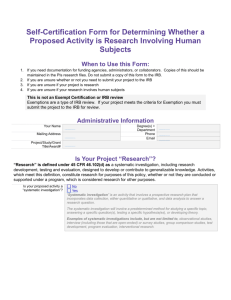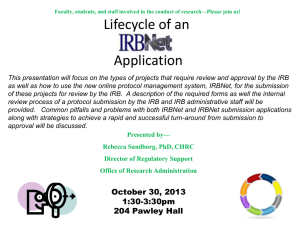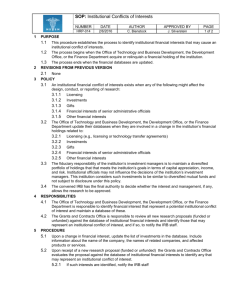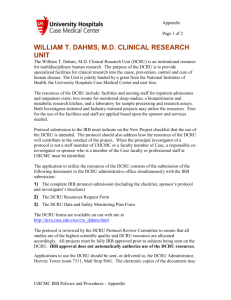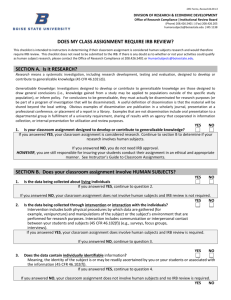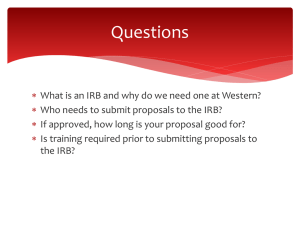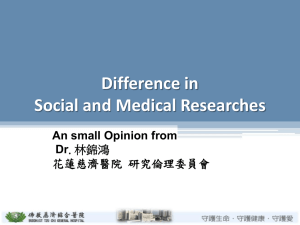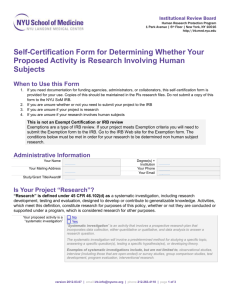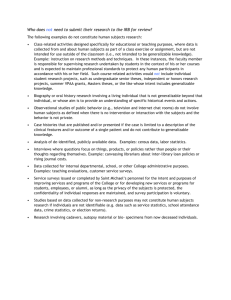Guidelines for Quality Improvement Research
advertisement
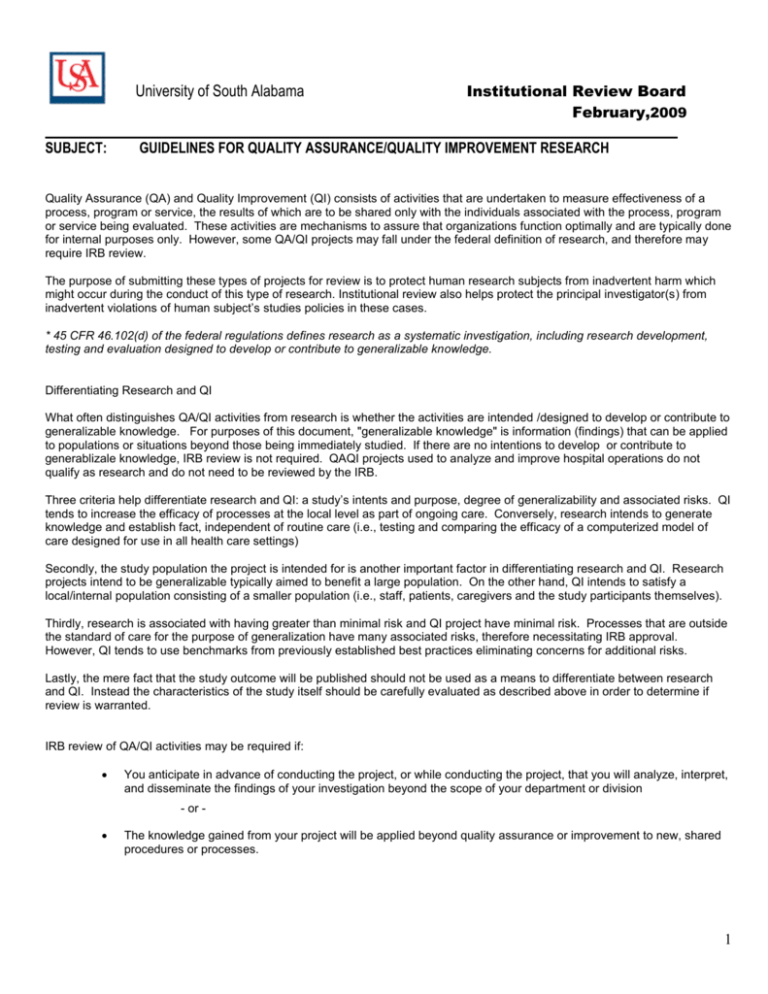
University of South Alabama SUBJECT: Institutional Review Board February,2009 GUIDELINES FOR QUALITY ASSURANCE/QUALITY IMPROVEMENT RESEARCH Quality Assurance (QA) and Quality Improvement (QI) consists of activities that are undertaken to measure effectiveness of a process, program or service, the results of which are to be shared only with the individuals associated with the process, program or service being evaluated. These activities are mechanisms to assure that organizations function optimally and are typically done for internal purposes only. However, some QA/QI projects may fall under the federal definition of research, and therefore may require IRB review. The purpose of submitting these types of projects for review is to protect human research subjects from inadvertent harm which might occur during the conduct of this type of research. Institutional review also helps protect the principal investigator(s) from inadvertent violations of human subject’s studies policies in these cases. * 45 CFR 46.102(d) of the federal regulations defines research as a systematic investigation, including research development, testing and evaluation designed to develop or contribute to generalizable knowledge. Differentiating Research and QI What often distinguishes QA/QI activities from research is whether the activities are intended /designed to develop or contribute to generalizable knowledge. For purposes of this document, "generalizable knowledge" is information (findings) that can be applied to populations or situations beyond those being immediately studied. If there are no intentions to develop or contribute to generablizale knowledge, IRB review is not required. QAQI projects used to analyze and improve hospital operations do not qualify as research and do not need to be reviewed by the IRB. Three criteria help differentiate research and QI: a study’s intents and purpose, degree of generalizability and associated risks. QI tends to increase the efficacy of processes at the local level as part of ongoing care. Conversely, research intends to generate knowledge and establish fact, independent of routine care (i.e., testing and comparing the efficacy of a computerized model of care designed for use in all health care settings) Secondly, the study population the project is intended for is another important factor in differentiating research and QI. Research projects intend to be generalizable typically aimed to benefit a large population. On the other hand, QI intends to satisfy a local/internal population consisting of a smaller population (i.e., staff, patients, caregivers and the study participants themselves). Thirdly, research is associated with having greater than minimal risk and QI project have minimal risk. Processes that are outside the standard of care for the purpose of generalization have many associated risks, therefore necessitating IRB approval. However, QI tends to use benchmarks from previously established best practices eliminating concerns for additional risks. Lastly, the mere fact that the study outcome will be published should not be used as a means to differentiate between research and QI. Instead the characteristics of the study itself should be carefully evaluated as described above in order to determine if review is warranted. IRB review of QA/QI activities may be required if: You anticipate in advance of conducting the project, or while conducting the project, that you will analyze, interpret, and disseminate the findings of your investigation beyond the scope of your department or division - or - The knowledge gained from your project will be applied beyond quality assurance or improvement to new, shared procedures or processes. 1 If at least one of the above statements applies to you, next consider whether proposed activities are a “systematic investigation”. For example, does your study systematically: 1. 2. 3. 4. 5. Gather information beyond what is routine for patient care, e.g., extra medical tests, surveys, or data collection? Assess the effectiveness of processes or procedures? Compare two or more treatments, interventions, or processes? Manipulate a current process to determine which is best? Does the activity involve additional risks or burdens to the participant? Furthermore public health research including surveillance, emergency responses, and program evaluations do not meet the DHHS definition of human subjects research. These activities constitute public health activities with the primary intent to prevent disease in a particular population, improve a public health program, or to provide emergency disaster relief and do not meet the DHHS definition of human subject’s research. Therefore, these activities do not have to be reviewed by an IRB. Examples: Source: Saint Louis University Example #1 To determine best staffing levels for an ER, management decides to analyze number of patients, number of staff, and how long patients wait for care over a number of months. The management team plans to present data at a conference in the fall. The QA project in Example #1 would need to be brought to the IRB for review since it involves systematic review of individuallyidentifiable data and it is known in advance of conducting the project that the findings will be shared beyond the department involved. Example #2 – To provide the best care to patients in the ER, management compares two different methods of triage. In one scenario, ER nurses are responsible for seeing the patients and determining who should be given priority care. In the other scenario, clerical staff makes this determination. One method is used for one month, the other the following month. Although the original intent for the project was to provide better care, once data were collected, the management team realized that findings could benefit other emergency departments and plans for dissemination were discussed. The QI study in Example #2 should have been submitted to the IRB once management intended to make findings generalizable. Comparing two processes where the data will generate generalizable knowledge (i.e. sharing results), would require IRB review. Example #3 Staff workload data are to be gathered solely for administrative purposes within the context of the normal efforts of a department or an institution to examine or to improve services or operations. This type of data gathering is not research and would not require IRB review because there is no foreseeable (intended) dissemination of the data. Any record of the data (or interpretations and analyses of the data) remains private, used only for purposes that are appropriate to the institution in the normal conduct of its work. Example #4Surveys whose primary purpose is to gauge the opinions and perceptions of internal and external customers (trainees, staff, patients, referring physicians, and others). These surveys are an integral component of organizational quality assessment and may be considered a quality improvement activity that does not require IRB review. Results of such surveys may yield new knowledge deserving of dissemination external to the Hospital through presentations and publications. If you are unclear about whether a project must be reviewed by the IRB, you are encouraged to consult with the Office of Research Compliance, 460-6625. References: Theodore D. Cosco, Alana Knopp, BA and Doris L. Milke, MSc, PhD. Research and Quality Improvement: The Investigative Forefront. Online Journal of Nursing Informatics, 11(3): October, 2007. 2
